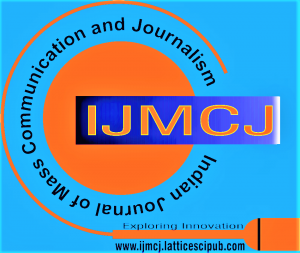![]()
Framing Theory Perspective of Identity and Narratives of Conflict in Nigerian Media
Aondover Eric Msughter1, Sabiu Garba2, Aisha Bala Rabiu3
1Aondover, Eric Msughter, Department of Mass Communication, Caleb University, Imota, Lagos, Nigeria.
2Sabiu Garba, Department of Mass Communication, Faculty of Social Sciences, Nasarawa State University Keffi. Aisha Bala Rabiu, Department of Mass Communication, Bayero University, Kano, Nigeria.
Manuscript received on 30 November 2021 | Revised Manuscript received on 12 December 2021 | Manuscript Accepted on 15 December 2021 | Manuscript published on 30 December 2021 | PP: 1-5 | Volume-1 Issue-2, December 2021 | Retrieval Number: 100.1/ijmcj.D1039062423 | DOI:10.54105/ijmcj.D1039.121221
Open Access | Editorial and Publishing Policies | Cite | Zenodo | Indexing and Abstracting
© The Authors. Published by Lattice Science Publication (LSP). This is an open-access article under the CC-BY-NC-ND license (http://creativecommons.org/licenses/by-nc-nd/4.0/)
Abstract: The first casualty in any conflict situation is often the nature of communication among the conflict actors. Perhaps, that is why conflict is commonly referred to as “breakdown in communication.” In this direction, this study examines framing theory perspectives of identity and narratives of conflict in Nigeria media. Conflict is naturally attractive and a source of news for the media. It is “the bread and butter” of journalism. Since independence in 1960, Nigeria has suffered some of the most obstinate conflicts, most of them constructed from differences in religious and ethnic identities. Religious and ethnic nationalism has led to conflicts about control of state power, unequal allocation of resources, economic decline, and religious clashes. In this context, the media have an important role to play in promoting honest, accurate, and timely information about the issues that will reduce tension, create the conditions for equitable development and reduce the level of ignorance and fear that contribute to misunderstanding and hostility in society. This presumption confers on the media the ability to either escalate or de-escalate conflict situations. This study, therefore, focuses on identity and media narratives of conflict, triangle and levels of conflict analysis, manifest and latent conflict management, including the role of the media in managing and resolving conflict.
Keywords: Conflict, Framing Theory, Identity, Media, Narratives and Perspective.
Scope of the Article: Journalism
